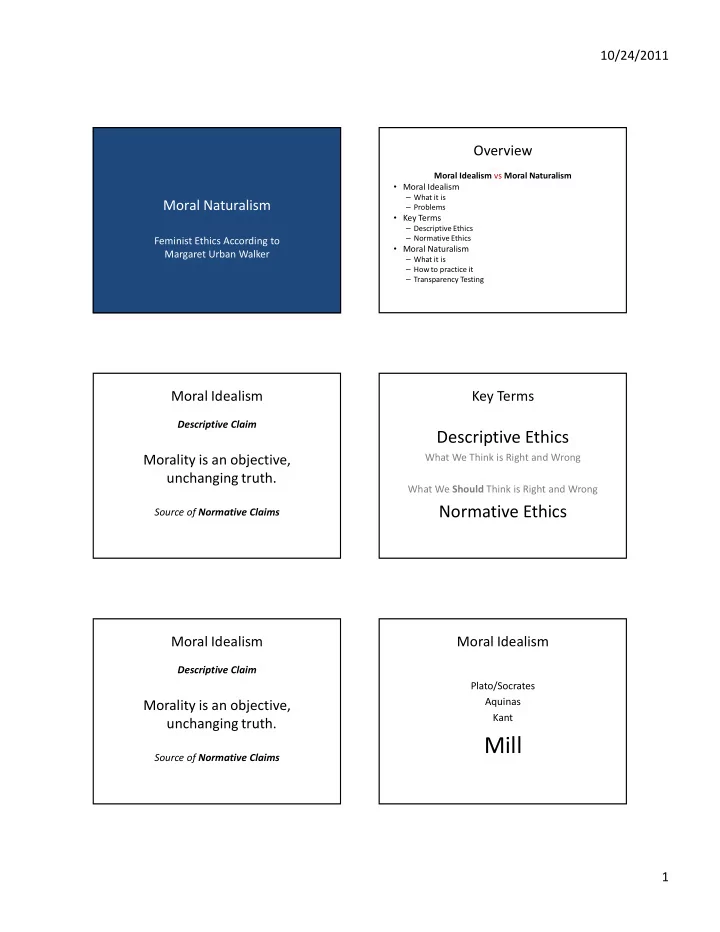

10/24/2011 Overview Moral Idealism vs Moral Naturalism • Moral Idealism – What it is Moral Naturalism – Problems • Key Terms – Descriptive Ethics – Normative Ethics Feminist Ethics According to • Moral Naturalism Margaret Urban Walker – What it is – How to practice it – Transparency Testing Moral Idealism Key Terms Descriptive Claim Descriptive Ethics What We Think is Right and Wrong Morality is an objective, unchanging truth. What We Should Think is Right and Wrong Normative Ethics Source of Normative Claims Moral Idealism Moral Idealism Descriptive Claim Plato/Socrates Aquinas Morality is an objective, Kant unchanging truth. Mill Source of Normative Claims 1
10/24/2011 Moral Idealism GHP Reflect Moral Naturalism Moral Naturalism Descriptive Claim: Descriptive Claim: “Morality is a naturally occurring Morality “is a disposition of powers structure of all human social through an arrangement of groups.” responsibilities.” Walker, pp 108 Walker, pp 106 Morality “is a disposition of powers through an arrangement of Morality “is a disposition of powers through an arrangement of responsibilities .” responsibilities.” Walker, pp 106 Walker, pp 106 Give an example of a Give an example of an responsibility institution that arranges responsibilities 2
10/24/2011 Moral Naturalism Moral Naturalism Form of Normative Claims : “Moral concepts and judgments are an integral Morality makes claims about part, but only one part , of practices that attempt to organize feelings, behavior, and the right way to live. judgment in ways that keep people’s expectations in rough equilibrium.” Walker, pp 107 Moral Naturalism Practices of responsibility “implement and enforce understandings of Reflect • who may do what to whom, • who must do what for whom, • and to whom various ones of us have to account.” Walker, pp 109 Moral Naturalism Normativity “the durability of our understandings What Kind of Tests? and the trust they support under the right kinds of tests.” Walker, pp 109 3
10/24/2011 Trust Trust • Certain basic understandings are common • These common understandings are the main Just ways some people can ones that shape our way of life make others behave • That this way of life is worthy of allegiance, effort, restraint, or sacrifice. Walker, pp 109 Walker, pp 109 Trust Trust • Certain basic understandings are common • These common understandings are the main Give an example of “Just ways ones that shape our way of life some people can make others • That this way of life is worthy of allegiance, behave.” effort, restraint, or sacrifice. Walker, pp 109 Activity Activity Think about your own life “. . . It is not safe to assume that people Think about the life you want to have typically know much of what they are really doing , and it is certainly doubtful that they know what and all that they are collectively Where are you going? doing in reproducing their form of life.” Walker, Moral Understandings, pp 250 4
10/24/2011 Activity Activity Get into your Groups Think about your own life Think about the life you want to have 1. Pass your paper to the person to your left. 2. Read the paper. 3. List two or more things that you think your Why do you want to be fellow group member values about the way of life they want. there? 4. Compare your lists. Are they different? Similar? 5. As a group, make a list of things that make a good way of life. Activity Activity Responsibility 1. who may do what to whom, What common understandings about life 2. who must do what for whom, does this class have? 3. and to whom various ones of us have to account. What understandings are not common? Walker, pp 109 Transparency Testing Normativity Are the understandings we think are Reflect shared actually shared? Are the understandings we think we have in common actually in common? 5
Recommend
More recommend